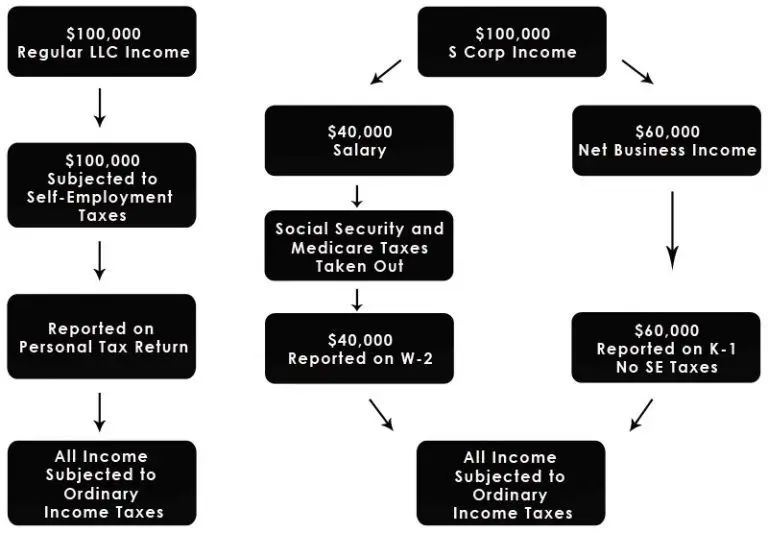
Business Advisory Services
Everything you need to help you launch your new business entity from business entity selection to multiple-entity business structures.
Hey - Our site just had a makeover and we are sorting through the hiccups!
Hey - Our site just had a makeover and we are sorting through the hiccups!

Everything you need to help you launch your new business entity from business entity selection to multiple-entity business structures.

Designed for rental property owners where WCG CPAs & Advisors supports you as your real estate CPA.

Everything you need from tax return preparation for your small business to your rental to your corporation is here.

Posted Thursday, August 7, 2025
Table Of Contents

There’s a misconception floating around out there that an S Corp is a standalone entity. Not true. The S Corp election is applied to an underlying entity with the primary purpose of reducing self-employment taxes. There are three basic business entities, with variations within. The three basic entities are:
Two notables missing from the list. First, sole proprietors are not an entity, nor is the variant “Doing Business As” (DBA). If you wake up and want to sell used copiers, you can, right now, without any formalized structure. It’s not smart, but certainly permissible (in some cases it is smart, such as California).
At times, sole proprietors are interchanged with single-member limited liability companies (SMLLC). The IRS and most states consider a SMLLC to be a disregarded entity for taxation. Both a sole proprietorship’s and a SMLLC’s business activities will end up on Schedule C of your Form 1040 tax return, however, they are truly different in several underlying ways.
Also note how an S corporation is not listed. It’s not an entity but a taxation election. The underlying entity has to be one of the above, and usually it’s an LLC (either single-member or multi-member) for the ease of formation yet corporations and professional corporations are common as well.
Sidebar: In California we usually set up corporations and then elect to have them taxed as an S corporation allowing the corporate officers to opt out of state disability insurance (SDI). That 1.2% of wages paid to the shareholder can really add up.
So while we might talk about your “S Corp,” or “S Corp Taxes,” or “self-employment tax reduction machine,” we are truly talking about your underlying entity being treated as an S Corp for taxation. Again, this is a common misconception — No big deal if you thought otherwise — many people do!
A common complaint from those who own their own business centers on self-employment tax: “Can I avoid, reduce, eliminate or lower my stupid self-employment taxes or SE taxes?”
Okay, perhaps you don’t say stupid… but, Yes, to a large extent actually, but it takes some effort and an S Corp election to lower your self-employment taxes.
As mentioned above, if you own a business as a garden variety single-member LLC (one owner), your business income will be reported on your individual tax return (Form 1040) under Schedule C and is subject to self-employment tax (currently 15.3%) and ordinary income tax. The same is true for a business that hasn’t formed a corporation such as a sole proprietor and partnerships. So, you could easily pay an average of 40% (15.3% in SE taxes + 25% in income taxes, blended) on all your net business income in federal and state taxes. Wow!
Income taxes are largely a sunk cost. You can reduce it by having less revenue, spending more money on deductible things and / or earning some of the various business tax credits. Therefore, these two tax tiers (self-employment taxes and income taxes) are attacked with different solutions.
If you own an LLC and have elected to be treated as an S corporation (Subchapter S) for taxation, the business now files a corporate tax return on Form 1120S. What’s the big deal? Before we get into that, let’s look at some quick numbers. These are based on using a salary of 40% of net business income for incomes up to $500,000 and then decreased incrementally to 30% for the millionaire at $2,500,000 below (real case actually).
The 40% is purely for illustrative purposes — we needed to pick some sort of salary to demonstrate the efficacy of the S corporation election and reduction in self-employment taxes. Your situation is probably different, and WCG CPAs & Advisors spends a lot of time with small business owners determining reasonable shareholder salary and officer compensation.
Here is a quick table to highlight the differences between an S Corp and an LLC-
| Consideration | LLC | S Corp |
| Self-Employment Taxes | Yes | No |
| Section 199A Deduction Ability | Max* | Max |
| Business Tax Deductions | Max | Max |
| 401k Plan | Yes | Yes |
| Liability Protection | Limited | Limited |
| Tax Return | 1040 / 1065 | 1120S |
| Headaches | Yes | Yes |
Quiz time! What’s the difference between an LLC and an S Corp? None, except the reduction of self-employment taxes and the tax return form number. That’s it! Ok, perhaps that is not entirely true.
The little asterisk above is referencing a phaseout of the Section 199A qualified business income deduction where a secondary test is used to determine (or limit) the deduction. Basically, it is 50% of the business income (profit) or 20% of the wages paid, whichever is lower. Since it is frowned upon for a non-S Corp’d LLC to pay wages to its owner(s), at times an S Corp election is required to “open up” the Section 199A deduction.
There are two additional burdens when exploring the S corporation vs LLC comparison.
One is tax return preparation, and subsequent fee. A Form 1120S is a business entity tax return and WCG’s fee is typically $1,500 to $1,800. The second burden is payroll processing; as an S corporation you must pay the shareholders a reasonable salary as employees. This too adds a financial burden as well as a series of administrative “touches.” But! As you will see, the savings can be significant. For a small increase in chores, you could easily save thousands of dollars. Yes, plural.
How can you avoid self-employment taxes? An S corporation might help. We will show you how the color of money changes when electing your entity to be taxed as an S Corp.
| Income | Total SE Tax | Salary | Total Payroll Tax | Delta | Delta% |
| 30,000 | 4,239 | 12,000 | 1,836 | 2,403 | 8.0% |
| 50,000 | 7,065 | 20,000 | 3,060 | 4,005 | 8.0% |
| 75,000 | 10,597 | 30,000 | 4,590 | 6,007 | 8.0% |
| 100,000 | 14,130 | 40,000 | 6,120 | 8,010 | 8.0% |
| 150,000 | 18,711 | 60,000 | 9,180 | 9,531 | 6.4% |
| 200,000 | 20,050 | 80,000 | 12,240 | 7,810 | 3.9% |
| 300,000 | 22,972 | 120,000 | 18,174 | 4,798 | 1.6% |
| 500,000 | 29,991 | 200,000 | 20,494 | 9,497 | 1.9% |
| 750,000 | 38,764 | 262,500 | 22,307 | 16,457 | 2.2% |
| 1,000,000 | 47,537 | 350,000 | 24,844 | 22,693 | 2.3% |
| 2,000,000 | 82,630 | 600,000 | 32,094 | 50,536 | 2.5% |
| 2,500,000 | 100,177 | 750,000 | 36,444 | 63,733 | 2.5% |
Don’t get too hung up on the drop in percentages. Instead, focus on the overall hard dollar amount. Notice the sweet spot at $100,000 to $150,000 (yes, it dips at $300k due to Social Security limits). Also consider that if you run self-employed health insurance through the business (and you should), savings jumps up even more. Why? Check out our book titled Taxpayer’s Comprehensive Guide to LLCs and S Corps, which massively expands on this concept.
Bottom line savings is about 8-10% of your net business income after expenses for those earning $100,000. So, if you make $100,000 after expenses you’ll save about $8,000 in overall taxes, and they’re all self-employment taxes.
Self-employment taxes = Social Security / Medicare taxes = payroll taxes.
All the same thing (in general). This is 8-10% number is just a jumping off point; as the table above shows, the percentage of savings goes down as income increases, but the overall savings continue to rise.
There is a cost to being an S corporation, of course — all that glitters is only partially gold. See below for our S Corp “all in” packages aptly named Vail, Telluride and Aspen. Yup, we’re from Colorado!
Still not sure or not convinced? No problem… please check out Line 4 from Schedule 2 on your Form 1040 tax return. This number reflects the self-employment taxes paid on your business income. We want to reduce this by 60 to 65%, and we assume you do too!
So, when your partnership, LLC, or corporation is being taxed as an S Corp, you are considered both an employee and a shareholder (think investor). As an employee, your income is subjected to all the usual taxes that you’d see on a pay stub: federal taxes, state taxes, Social Security taxes, Medicare taxes, unemployment taxes and disability insurance (state specific). However, as a shareholder or investor, you’re simply getting a return on your investment much like a dividend (in S Corp world this is called a shareholder distribution).
A K-1 is a statement that each shareholder receives, and it is similar to a W-2 since it reports the income that each shareholder is responsible for from a taxation perspective. There are two types of K-1s for the purposes of our discussions –one is generated from a Form 1065 and the other is generated from a Form 1120S. A Form 1065 is also called a partnership tax return, and typically your K-1 income will be subjected to self-employment taxes.
Let’s look at another visual in terms of how the money travels (picture time!)
 However, a K-1 generated from a Form 1120S (an underlying entity with the S Corp election) is reported on the shareholder’s personal tax return on Schedule E, Page 2 just like most K-1s, but it’s not subjected to self-employment taxes. Schedule E is the form used for rental properties, royalties, and other investment income, including business income from an S corporation.
However, a K-1 generated from a Form 1120S (an underlying entity with the S Corp election) is reported on the shareholder’s personal tax return on Schedule E, Page 2 just like most K-1s, but it’s not subjected to self-employment taxes. Schedule E is the form used for rental properties, royalties, and other investment income, including business income from an S corporation.
When we say self-employment taxes, we’re really talking about Social Security and Medicare taxes. From a sole proprietor perspective, they are self-employment taxes. From an employee perspective, they are Social Security and Medicare taxes (FICA). Same thing.
An S Corp doesn’t pay taxes, per se, since it’s a pass-thru entity, and passes its tax obligation to the investors. There are some states that charge a franchise tax such as California and Texas, and other states have an S corporation tax that is egregious such as Tennessee and New York City. There are some other nuances with Portland / Multnomah County with the way they handle reductions for owner compensation.
Please read the full story on S corporation taxes and self-employment taxes in our Taxpayer’s Comprehensive Guide to LLCs and S Corps.
Here are the quick benefits of an S Corp election:
Do you want a more obscure S Corp benefit? Of course you do!
A Qualified Subchapter S Subsidiary, also known as a QSub or QSSS, is simply an S corporation that’s owned by another S corporation. A QSub is treated as a subsidiary of the parent S corporation. Why should you care? At times, you want to merge two businesses, but the assets are immovable (think of a Medicare certification or a specialized defense contract). You might need to select one before the combination because of certain rules with the merger.
You might also want to combine gross receipts for the passive investment income test, or combine basis between stock and loan basis, or combine to release accumulated earnings and profit (AE&P).
Are you regretting asking? It’s OK — we’ll move along.
 So we showed you all the benefits, fees and such… but we need to put the horse back in front of the carriage. Let’s go through a quick checklist to ensure that we are not going down the wrong road. As Doc Brown in Back to the Future says, “Roads? Where we’re going, we don’t need roads.” Well, in S Corp Land, we do:
So we showed you all the benefits, fees and such… but we need to put the horse back in front of the carriage. Let’s go through a quick checklist to ensure that we are not going down the wrong road. As Doc Brown in Back to the Future says, “Roads? Where we’re going, we don’t need roads.” Well, in S Corp Land, we do:
Are you still here? Excellent news — read on! You can also complete an online secure form of the above questions, and send them to us for review.
Not everything that glitters is gold so there are a handful of downsides, some manageable, to the S Corp election or having an LLC. A lot of these examples stand alone, and some of these depend on the net income of the business and other external factors. WCG can help guide you through the decision-making process. Specifically, in our discussions we will review these disadvantages to having an S corporation-
Did you want to chat about the S Corp election? Does it make sense for you? How does this impact your world? Are you curious about S corporation vs LLC?
The tax advisors, business consultants and rental property experts at WCG CPAs & Advisors are not salespeople; we are not putting lipstick on a pig expecting you to love it. Our job remains being professionally detached, giving you information and letting you decide within our ethical guidelines and your risk profiles.
We see far too many crazy schemes and half-baked ideas from attorneys and wealth managers. In some cases, they are good ideas. In most cases, all the entities, layering and mixed ownership is only the illusion of precision. As Chris Rock says, just because you can drive your car with your feet doesn’t make it a good idea. In other words, let’s not automatically convert “you can” into “you must.”
Let’s chat so you can be smart about it.
We typically schedule a 20-minute complimentary quick chat with one of our Partners or our amazing Senior Tax Professionals to determine if we are a good fit for each other, and how an engagement with our team looks. Tax returns only? Business advisory? Tax strategy and planning? Rental property support?

Taxes can be tricky. Chat with a WCG human now and get questions answered.
Section 199A deduction, also known as the Qualified Business Income deduction, arises from the Tax Cuts & Jobs Act of 2017. This is a significant tax break for small business owners, but there are rules and limits, of course. We’ve written several articles which outline what is considered a qualified business for the qualified business income deduction, including the dreaded specified service trade or business (SSTB) definitions (which is easily summed up as “any trade or business where the principal asset is the reputation or skill” of the owner). Click on the buttons below for our articles:
S corporations remain a critical tax saving tool for two reasons. First, the usual self-employment tax savings remain intact for all business owners, including specified service trades or businesses. Second, a business owner might need to pay W-2 wages to himself or herself to avoid being limited by income, and only corporations can pay W-2 wages to owners (in other words, an LLC cannot without an S Corp election). Read the articles above for riveting information, including W-2 optimization and reasonable shareholder salary.
How does all this work? Good question! To take an entity and have it be taxed as an S corporation by the IRS and your state, paperwork must be completed and submitted. For the IRS, Form 2553 is the necessary form, and it is typically due within 75 days of the fiscal year of the entity or within 75 days of inception. What if it’s summer, and you realized your dog ate your S Corp election paperwork? No worries! In classic IRS fashion, there is one rule and about a hundred exceptions, and Form 2553 is no different. There are provisions for a late S corporation election. We can help.
Back to the issue! Form 2553 is signed in wet ink (the IRS does not accept Adobesign or Docusign or any of those online signature apps) and then either faxed or mailed. We prefer fax. In about 10-12 weeks, you’ll get an S Corp election acceptance letter. Done! If the IRS screws up the effective date, we can fix that too. Remember, they are humans, and can fat-finger a number like anyone else.
How do you form an S corporation? Technically, how do you create an entity (LLC, PC, etc.) and have it taxed as an S Corp? Let’s talk about it! Latesha Anderson of WCG CPAs & Advisors.
Form 2553 (the S Corp election form) must be filed with the IRS. It’s typically due within 75 days of forming your business entity or the fiscal year start (such as January 1), however, there is relief for the late filing of Form 2553, and we can guide you through that. IRS Revenue Procedures 2003-43 and 2004-48 used to be the governing rules, but the IRS has simplified it (imagine that!) with Revenue Procedure 2013-30.
We have an entire webpage dedicated to the late S Corp election. We can go back to January of the previous year! Yeah, baby! Check it out here:
![[page_title]](https://wcginc.com/wp-content/uploads/Business-Elections.jpg)
Expert Late S Corp elections back to January, 100% success! Learn more!

An LLC is a legal business entity, while an S corporation is a tax election applied to an existing entity, such as an LLC or corporation. The biggest difference is that an S corporation can reduce self-employment taxes, while an LLC without the election pays them on all business profits. The tax return forms also differ—LLCs often file on Form 1040/Schedule C or Form 1065, while S corporations file Form 1120S.
Yes. First, form your LLC or corporation, then apply for an EIN with the IRS. Once you have your EIN, you can file Form 2553 to elect S corporation status. So, it is not really a “can I” but rather “you must.”
Form 8832 changes an entity’s tax classification. It’s not always needed for an S corporation election, but if your entity’s default classification isn’t eligible, you may need to file Form 8832 before submitting Form 2553.
A C corporation pays corporate income tax, while an S corporation passes income to shareholders without corporate-level taxation. S corporations often save owners from double taxation and reduce self-employment taxes compared to C corporations.
No. “LLC corporation” isn’t an official term—LLCs and corporations are separate entities. However, an LLC can elect to be taxed as an S corporation for potential tax savings. Having said this, a lot of people will talk about their “LLC S Corp” which is not terribly wrong- it suggests an LLC taxed as an S Corp and most tax professionals will know what you mean. Even your bartender.
S corporations generally have no federal corporate tax rate because they are pass-through entities. However, some states charge an S corporation tax or franchise tax, such as California’s 1.5% or Tennessee’s corporation rates. New York City, Yup. There are a lot of little taxes imposed by various states and local governments.
A Qualified Subchapter S Subsidiary (QSub) is an S corporation owned entirely by another S corporation. A QSub is treated as part of the parent S corporation for tax purposes, often used for mergers, asset combinations, or industry-specific compliance. Commonly used in business combinations (mergers) when assets are immovable like a Medicare certification or defense contract, or similar.
Benefits include reducing self-employment taxes, qualifying for the Section 199A deduction, enabling SALT deduction workarounds, lowering audit risk, and avoiding certain state taxes that apply to LLCs. Booyeah!
Yes. In a standard LLC, all profits are subject to self-employment tax. In an S corporation, only the shareholder’s salary is subject to payroll taxes, while distributions are not—often saving 8–10% of net income depending on salaries paid and fringe benefits like self-employment health insurance.
Yes. If you work in the business, the IRS requires a “reasonable salary” before taking additional distributions. This keeps the S corporation in compliance. Oh, and this is real salary- real paystubs, real W-2, real 941s, real payroll!
No. Form 8832 changes an entity’s tax classification, while Form 2553 elects S corporation status. Sometimes both are needed, but they serve different purposes. It is rare to use Form 8832 when using Form 2553. However, Form 8832 is commonly used on the back-end when you are reverting your LLC taxed as an S Corp back to just a disregarded entity LLC.
Yes, you can go back 3 years and 75 days for a late S corporation election under IRS Revenue Procedure 2013-30. There are some pain points to consider and review.
C corporations pay a flat 21% federal rate plus possible dividend taxes. S corporations avoid corporate-level tax, passing profits to owners for taxation at individual rates. Sounds sexy right? 21% is less than 35%. But! Don’t forget C Corp dividends will pay 21% + 15-23.8% combined… or about 36% to 44%. Yuck.
Yes. Some states charge higher fees on LLCs than S corporations. For example, California’s LLC fee structure can be avoided or reduced with an S corporation election. How? LLCs in California pay a fee based on gross receipts regardless of profit- you S Corp this thing, and now it is 1.5% of profit with an $800 minimum (as of the 2025 tax year).
Drawbacks include higher administrative costs, ownership restrictions, limited fringe benefits, inability to retain earnings easily, and stricter compliance requirements. However, with a mothership baby S Corp construct in a multi-entity arrangement, this is avoided including ineffective S Corp elections.
 WCG CPAs & Advisors specializes in small businesses who generally have fewer than 25 employees. Why? We want to help people, and more importantly we want to help the business owner directly. Frankly speaking, once a business gets to a certain size management layers get in the way of owner access. Access allows us to ensure the owner(s) are leveraging the most out of their business for themselves and their families.
WCG CPAs & Advisors specializes in small businesses who generally have fewer than 25 employees. Why? We want to help people, and more importantly we want to help the business owner directly. Frankly speaking, once a business gets to a certain size management layers get in the way of owner access. Access allows us to ensure the owner(s) are leveraging the most out of their business for themselves and their families.
Because small business is a core competency for us, we have created Business Advisory Service platforms which include these really cool things-
Vail | Telluride | Aspen | |
Compliance & Preparation | |||
| Business Entity Tax Return (Form 1065, 1120, 1120S) [more] | |||
| Business Tax Projections (Franchise, Privilege, Receipts) | |||
| Individual Tax Return (Form 1040, joint filing) [more] | |||
| Tax Return Review Meeting | |||
| Tax Resolution, Audit Defense [more] | Advanced | Advanced | Advanced |
| State Income Apportionment, Nexus [more] | Add-On | Add-On | Add-On |
| Expat / Foreign Income Filings (FBAR, 8938) [more] | Add-On | Add-On | Add-On |
Strategic Tax Planning | |||
| Tax Advisory, Tax Reduction, Business Reviews [more] | 2 Sessions | 2 Sessions | Custom |
| Pre-Planning Meeting (May/Jun) | |||
| Household Tax Projections [more] | |||
| Business PTET Optimization [more] | |||
| Payroll Planning, Optimization [more] | |||
| Reasonable Shareholder Salary Calculation (RCReports) | |||
| Tax Projections Review Meeting (Jul/Aug) | |||
| Section 199A Deduction Optimization [more] | |||
| Small Business Tax Deductions Optimization [more] | |||
| Estimated Income Tax Calcs (via Payroll) [more] | |||
| End of Year Wrap-Up Meeting (Oct/Nov) [more] | |||
| Situational Tax Law Research (up to 3 hours) | |||
Payroll & Accounting | |||
| Monthly Shareholder Payroll Processing[more] | DIY | DIY | DIY |
| Quarterly QuickBooks Consulting (QuickStart) [more] | Add-On | Add-On | |
| Accounting Services (Bookkeeping + Analysis) [more] | Add-On | Add-On | Add-On |
| Financial Statement Review [Reach Reporting] | Inc with AST | Inc with AST | Inc with AST |
Business Advisory & Support | |||
| Periodic Quick Chats (May-Nov) [more] | 3 Chats | 3 Chats | Routine |
| Interfacing with Lenders, Attorneys, Planners | Add-On | Routine | Routine |
| CPA Concierge Services [more] | Add-On | Add-On | |
| Financial Analysis (Cash Flow, Budgeting, KPIs) | |||
| Annual Corporate Governance (Resolutions) | Add-On | Add-On | |
| Annual Fee* | $4,500 | $4,980 | Custom |
| Paid Monthly | $375 | $415 | Custom |
| (prorated based on onboarding date) | |||
The primary difference between Vail and Telluride is business entity tax projections which focuses on state-level taxes such as franchise taxes and pass-through entity tax calculations. See below for more details.
Custom! Unlike the modern day new car packages where you have to spend $8,000 for the moonroof, our Business Advisory Service plans can be customized specifically for you. The array above is simply a starting point. If you need more or less from us, let’s chat about it!
Fees Updated! Our Business Advisory, Investor Patrol and Tax Patrol Service fees were updated August 2024, and we usually hold fees for at least two years (or through December 31, 2026) unless inflation skyrockets back to 9%.
Yeah, we all dislike the little asterisk. The gotcha! The fine print! Well, here is one of those situations. Tax projections under our Vail platform does not include business-entity tax projections and payments (California’s Franchise Tax, New Jersey’s BAIT, Portland’s overall madness, NYC, etc.), pass-through entity tax (PTET) calculations and payments, among other things. Not every business entity needs separate tax projections or planning! Texas, No. California, Yes.
Please see our Tax Planning Services page and Master Service Agreement for more information.Our Telluride Business Advisory plan includes entity specific tax projections as we just described plus interfacing with lenders, attorneys and financial planners (yawn). Here is a quickie listing of our tax planning service levels-
Afraid of bait and switch? Yeah, we think that stinks too. Our annual fee for Vail, as an example, is $4,500. What can make this fee go up? The most prominent reason is additional state tax returns (taxing jurisdictions). However, we will detail that in your proposal. Please see our individual and business entity tax return preparation pages for more information.
Quarterly financial statements analysis is an add-on service, however it is included automatically if you use our accounting services.
 We also have Tax Patrol! This is another wonderful tax service for those who don’t need business advisory services or real estate investment support, but from time to time want some love from an experienced tax consultant and business advisor. Have a quick tax question? Need to know the depreciation rules as you buy that new car? Wondering what your April tax bill is going to be in August? Your spouse upgraded to a different job- how is that going to affect things? You received a big bonus- yay, but how will that impact your tax bill?
We also have Tax Patrol! This is another wonderful tax service for those who don’t need business advisory services or real estate investment support, but from time to time want some love from an experienced tax consultant and business advisor. Have a quick tax question? Need to know the depreciation rules as you buy that new car? Wondering what your April tax bill is going to be in August? Your spouse upgraded to a different job- how is that going to affect things? You received a big bonus- yay, but how will that impact your tax bill?
| Keystone | Copper | Breck | |
| Individual Tax Return Prep (Form 1040, joint filing) [more] | |||
| Business Entity Tax Return Prep (Form 1065, 1120, 1120S) [more] | |||
| Household Tax Projection [more] | |||
| Business Tax Projections, PTET Calcs, SALT Workaround [more] | |||
| Estimated Tax Payments Calcs | |||
| Tax Resolution, Audit Defense [more] | Advanced | Advanced | Advanced |
| Complimentary Quick Chats (CQC) [more] | Routine | Routine | Routine |
| Annual Fee* | $1,740 | $2,400 | $3,360 |
| Paid Monthly | $145 | $200 | $280 |
| (prorated based on onboarding date) | |||
Our Copper and Breck Tax Patrol Services platforms do not include reasonable owner salary recommendations and optimization, including 401k, fringe benefit and health insurance matters as they relate to payroll processing. Should you require these services, our Business Advisory platforms (Vail, Telluride, Aspen) above, like way above, might be a better fit.
On one hand we have our Business Advisory Service plans which are very comprehensive yet might contain some services that not everyone needs such as salary optimization, payroll processing, multiple tax planning events, among other things.
On the other hand we have transactional relationships where clients come in each spring for tax return preparation, and that’s all they need. No questions. No tax planning. Just a pile of tax documents and a few discussions later and bada bing bada boom they have a tax return and a nice summer.
 Is there an in-between? Boom! We have Investor Tax Patrol which is a fancy add-on to our Keystone Tax Patrol platform above.
Is there an in-between? Boom! We have Investor Tax Patrol which is a fancy add-on to our Keystone Tax Patrol platform above.
Investor Tax Patrol is a wonderful tax service for those who don’t need all the advisory bells and whistles, but desire tax planning and, at times, scenario-based decision making assistance from an experienced real estate CPA and tax consultant. Have a quick tax question? Need to know the depreciation rules as you furnish that new short-term rental? Want to kick around Real Estate Professional designation? Wondering what your April tax bill is going to be in August?
Consider these typical fees for a tax-only engagement for rental property tax return preparation. We'll get into an example in a bit-
Here are typical rental property tax prep fees that might be added to your individual tax return (Schedule E reported on Form 1040) or partnership tax return (Form 8825 reported on Form 1065).
Please keep in mind that each rental property is a small business with varying complexity. Operating expenses, improvements, home office deduction including travel, automobile expenses, paying your children, allocated expenses among several rentals among other nuances are business-like considerations and add to the comprehensiveness that WCG provides with rental tax return preparation (learn about our Rental Expert Pod as well).
| Rental Tax Prep, Prepared Financials (Rental Bookkeeping) | $100 ea |
| Rental Tax Prep, Clean DIY Records (The SRO Template) | $150 ea |
| Rental Tax Prep, Complex or Messy Records (disguised disorganization) | $200 ea |
| Add On: Existing Rental converting to STR | $75 |
| Add On: Streamlined State Tax Return (in addition to your resident state) | $125 to $200 |
| Add On: Complex State Tax Return (see below for what makes complex, complex) | $250 to $400 |
| Add On: Cost Seg Setup + 3115 / 481(a) Calc, Existing Rental Prior to 2025 | $625 |
| Add On: Short-Term Rental Activities (non-investor patrol) | $75 |
| Add On: Rental Property Sale | $250 |
| Add On: 1031 Like-Kind Exchange and New Setup | $450 |
| Add On: Complex 1031 (2:1, 1:2) and New Setup(s) | $750 |
As promised, let's get into an example. Let's say you have 2 rentals, with one being a short-term rental in another state.
| Keystone Tax Patrol (as our base) | $1,740 |
| First Rental Included | $0 |
| Second Rental, Short-Term | $175 |
| Streamlined Additional State Tax Return | $125 |
| Annual Fee | $2,040 |
| Monthly | $170 |
Custom! In the past we tried to have a "3 platform" approach to our rental property owners and real estate investors like we do for business advisory and tax patrol above. There is just way too much customization with rentals- one size fits all is great, but rentals are like snowflakes.
 Investor Patrol is specifically designed to give you the freedom to call, text or email us without the worry of being nickeled and dimed like other outdated CPA firms. And! We also provide a tax planning event (usually around May, June and July) where we gather up your financial records like paystubs, rental activities, stock sales, etc. and we create a mock tax return projecting your annual income and eventual tax obligations. We are not big on surprises… bad news in August is palatable, yet bad news on April 15 is unacceptable. Let’s not forget that Investor Patrol also includes IRS audit defense for any tax return that we prepare. Please review our full Investor Patrol Services webpage for all kinds of fine print for your consideration. It’s really not that much.
Investor Patrol is specifically designed to give you the freedom to call, text or email us without the worry of being nickeled and dimed like other outdated CPA firms. And! We also provide a tax planning event (usually around May, June and July) where we gather up your financial records like paystubs, rental activities, stock sales, etc. and we create a mock tax return projecting your annual income and eventual tax obligations. We are not big on surprises… bad news in August is palatable, yet bad news on April 15 is unacceptable. Let’s not forget that Investor Patrol also includes IRS audit defense for any tax return that we prepare. Please review our full Investor Patrol Services webpage for all kinds of fine print for your consideration. It’s really not that much.
Also, please check out our rental property book titled I Just Got A Rental, What Do I Do? This is our second book. Our first book, Taxpayer’s Comprehensive Guide to LLCs and S Corps, was first published in 2014 and was well-received by small business owners and tax professionals, so we thought a book on rental properties and real estate investments would be equally helpful. So, here we are with our second iteration, or the 2025 edition. We plan to update annually.

We publish our typical fees, but then again they are scattered across several pages and sections of our website. Click below for a consolidated no thrills fee table that combines all our various fees for tax return preparation, tax resolution, accounting services, payroll processing and business services into a simple one pager (you might have to scroll a bit).
Here are some quickie FAQs to learn more about WCG CPAs & Advisors, and how we do business-
Nope. We have a t-shirt that reads, “Hate extensions. Love our summers.” We file 70% of our tax returns by April 15, and only extend per the client’s request or if there is missing data such as a rogue K-1. We’ll go as quickly as you let us! Also, we don’t have A listers… we prepare tax returns in first-in first-out sequence. Sure, we leave room for emergencies or other issues that allow for jumping the line.
Good question! Our Business Advisory Service plans (Vail, Telluride and Aspen) are more advisory forward like a robust old-fashioned with lots of planning, tax strategies and business consultation to help you make decisions. Our Tax Patrol Services (Keystone, Copper and Breck) are more tax return preparation forward like a refreshing vodka-lemonade with less tax planning, or at least less-intensive planning and consultation.
Investor Patrol Services for our rental property owners and investors is somewhere in-between since real estate is a business like any other requiring more tax planning, strategy and consultation but falls short of needing shareholder payroll planning and processing.
 How Often Do We Schedule Meetings?
How Often Do We Schedule Meetings?Up to you, but within a structured framework! In the past, we tried rigid quarterly meetings, but they often felt like a chore for everyone. Then went full tilt the other way with a "call us anytime" approach. Duds on both sides.
Today, we operate on a 'Rhythm of the Relationship' model.
For Business Advisory clients, we generally connect about 8 times a year. This is a mix of strategic milestones where we reach out to you (Pre-Planning, Projections, Year-End Wrap-Ups) and On-Demand Support where you reach out to us (Tax Return Reviews, Advisory Sessions, and Scheduled Periodic Quick Chats). We provide the structure to keep you safe, but your goal is to use the on-demand access to extract everything you need.
And our Tax Patrol including Investor Patrol engagements can expect core strategic coverage including tax return reviews, pre-planning meeting, and tax projections, plus access to the same quick chats when life happens.
We prefer scheduled meetings over Teams. Check out our CPA Concierge Service as well. Priority boarding. HOV lane. Early check-in.
We rely heavily on emails and text message alerts. However, we do not have an allergy to the telephone. During friendly hours (let’s say 8AM to 7PM including weekends) we will usually call first if we have a question or need clarification.
Having said that, email can be an effective communication tool, and it is especially good for questions that require thought and good for memorializing conversations. While email is a chore for most people it can also be a distraction. Your WCG team is no different.
As such, we have two big rules that you need to be aware of-
When we have our amazingly productive and efficient conversation via Teams or phone call, we will always send a recap email to memorialize all the goodies. This recap email also gets captured by our workflow software allowing all other team members to view the recap as necessary.
For tax, we have two-person teams so there is always a backup. Teams are assigned based on who first spoke with you, bandwidth and subject matter expertise. We also have accounting, payroll and business formation / governance. As such, you might have 4 people you work with. Yay! The two tax peeps, and if applicable, a payroll peep to help with setup and training, and an accounting peep (if you are using our Accounting Services team for bookkeeping + analysis). We also have dedicated Client Support and Tax Support teams to… well… support you and the other teams.
Are you interested in business advisory services? Just tax return preparation? Do you own a rental property and need assistance? Let's chat!

Let's schedule a 20-minute discovery meeting with one of our Partners or Senior Tax Professionals to understand your tax footprint and objectives, and how WCG CPAs & Advisors might help.

Taxes can be tricky. Chat with a WCG human now and get questions answered.
Our accounting services go beyond simple data entry by pairing professional bookkeeping with high-level financial analysis to help you understand exactly where your business is headed. Whether you are an S Corp owner or a real estate investor, we provide the "defensive" accounting needed to protect your tax deductions and ensure your books are always tax-ready- planning or preparation!
| Monthly Accounting (bookkeeping + analysis) [more] | starting at $525 per month |
| Bi-Monthly Accounting (bookkeeping + analysis every 2 months) | starting at $280 per month |
| Quad-Monthly Accounting (bookkeeping + analysis every 4 months) | starting at $190 per month |
| Annual Compliance Bookkeeping For Tax Return Prep [more] | typically $1,200 annually |
| Annual Accounting | starting at $1,800 annually |
| Rental Property Bookkeeping [more] | starting at $1,200 annually |
| Sales Tax | typically $75 per month, or typically $150 per quarter |
| Personal Property Tax | typically $40 per month, or starting at $500 annually |
Fine Print: Starting accounting service fees are based on 2 bank accounts (one checking account and one credit card is 2 accounts) with less than 250 monthly transactions. Our fee does not include the QBO subscription fee from Intuit. Custom quote is available if you have a lot going on such as third-party integrations (POS, time billing system), accrual accounting method, extensive benefits packages and / or industry specific issues (e.g, job costing in construction). The first step for Accounting Services is to do an accounting assessment with one of our experts to determine scope, service level and ultimate fee (see button below).
The following are additional business services to get your venture launched and on the way. Some of these are teased out separately as one and done fees like formation and onboarding stuff.
Business Formation | |
| Articles of Organization or Incorporation, or Dissolution | $625 + state filing fee |
| Initial Report (if required) | $125 + state filing fee |
| Annual Report | $350 + state filing fee |
| Employer Identification Number (EIN) | Included |
| Single Member Operating Agreement (SMLLC) | Included |
| MS Word Templated Bylaws Agreement (Corporations) | Included |
| S Corp Election, Timely Election (made with formation) | Included |
| Accountable Plan | Included |
Onboarding Fees (one and done) | |
| Payroll Accounts Setup, Transfer, Closing | $550 to $650 depending on state |
| Payroll Quick Launch, Account Setup | $950 to $1,050 depending on state |
| Accounting Setup or Transfer (Fractional Controller) [more] | Varies |
| QuickStart, QuickBooks Setup and Support (90 days) [more] | $750 |
| S Corp Election, Timely Election (within 75 days) | $450 |
| Late S Corp Election Back to January 2024 [more] | $600, $1,200 after Jan 1 2024* |
| Examine Prior Tax Return | Included |
For late S Corp elections back to January, we have a split fee of $600 or $1,200… and it depends on if we can file your S Corp by March 15. Ideally, we attach the late S Corp election to the tax return and file both electronically. Yay! Conversely, if we cannot file on March 15, we also cannot electronically extend the tax return. As such, when we file in June or July, it is now considered late. We can usually have the penalties abated, but it takes effort hence the additional $600 fee (the $600 v. $1,200). Be a hero, and get us your stuff right away to save a few bucks and trim down the anxiety.
Business Maintenance | |
| Entity Relocation Package (payroll closure and opening, entity move) [more] | $800 (some are $1,050) + state filing fees |
| Address Changes w/o Payroll (IRS, State Dept of Revenue, Secretary of State) | $250 + state filing fees |
| Address Changes with Payroll (above + state and local payroll agencies) | $350 to $450 + state filing fees |
Our entity relocation package includes closing your current payroll accounts, opening shiny new ones, moving your entity with the Secretary of State (if applicable) and updating addresses as necessary.
Speaking of address changes… these are tough. Basic address changes require IRS, State Department of Revenue and Secretary of State notifications. Address changes that include payroll add another level of complexity since departments of revenue are not the same as departments of labor, and there might be local or municipal agencies as well.
WCG’s advisory engagements are billed on an annualized basis and are tied to defined deliverables and scheduled advisory touchpoints. These typically include tax return preparation and review, a pre-planning meeting, a tax projection deliverable and review, and periodic scheduled quick chats (May to Nov). Our Business Advisory Services (BAS) engagements also include tax advisory meetings and an end-of-year wrap-up meeting. Because these services are scheduled and delivered over the course of the year, our annual advisory fee does not fluctuate based on when individual services are used or delivered.
When an engagement begins partway through the year, the total annual fee is prorated over the remaining months of the year. As a result, the monthly billing amount will be higher, even though the annual fee itself remains unchanged and reflects the full scope of advisory work to be delivered.
Beginning in August, WCG no longer bundles tax return preparation into new annual advisory engagements. Frankly, bundling everything into a single monthly number can look unusually high and distract from the actual year-round planning work we deliver. Instead, advisory services will be structured as a custom annual fee covering the remaining or needed planning and advisory work, including pre-planning meetings, tax projections and reviews, tax advisory meetings, periodic scheduled quick chats, and an end-of-year wrap-up meeting.
Tax return preparation including review will be invoiced separately at the time the tax return is prepared, typically during the following tax season. This structure more closely aligns advisory fees with year-round planning work and separates compliance services that occur at a different point in time.
WCG has shifted payroll to a setup-and-planning model. Ongoing payroll processing is not sustainable at the market price point for a CPA firm, and this change allows our tax advisors to focus on higher-impact tax planning and strategy for clients. It also allows our team to spend more time on tax return optimization. In short, we are doubling down on what we do best.
We continue to support payroll through proper account setup, training, and payroll planning, while ADP handles the compliance engine, including calculations, filings, deposits, and year-end forms. This approach provides clients with flexibility and control while ensuring payroll is handled correctly. Learn more here.
You can prepare your own individual tax return as well… but the benefit of WCG preparing both individual and business tax returns is that we can slide things around depending on income limitations, phaseouts, Section 199A deduction optimization, pass-through entity tax deductions (PTET), etc. Having our arms around both worlds can create real tax savings!
Note: An individual tax return is what the IRS calls Form 1040 and refers to the entity filing the tax return (you, the individual, are the entity). However, a married couple are deemed to be one entity for the sake of an individual tax return. So, when we say we will prepare your individual tax return, it is meant to include your spouse in a jointly filed happy happy joy joy tax return.
Break-even analysis is based on our annual advisory fee of $4,500 for our Vail package plus the expected cost of you processing your payroll through ADP of around $900. If an S corporation saves you 8% to 10% (on average) in taxes over the garden-variety LLC, then $5,400 divided by 9% equals $60,000 of net ordinary business income (profit) after expenses and deductions.
This doesn’t factor in the lower audit rate of S Corps versus Schedule C activities, plus the ability to use business funds to pay for your state income taxes otherwise known as the Pass-Thru Entity Tax Deduction (PTET) or the great SALT workaround.
More sales pitch! Keep in mind that our fee of $4,500 includes your individual tax return which you might already be paying another tax professional to prepare. WCG CPAs & Advisors has a handful of clients who are right at the break-even point of $60,000 but leverage an S Corp and our services to get tax return preparation, tax strategies and consultation.
We are not salespeople. We are not putting lipstick on a pig, and trying to convince you to love it, even if Tom Ford’s Wild Ginger looks amazing. Our job remains being professionally detached, giving you information and letting you decide.
 Moreover, many CPAs and tax professionals thrust their risk aversion onto their clients. This is bad. At WCG CPAs & Advisors we must perform our due diligence and hurdle our ethical and professional standards. However, after those gymnastics we present a risk-based analysis to the tax return and let you, the client and taxpayer, decide how to proceed. Having said that, we don’t entertain tax scammers or those who can take down the ship. Arthur Anderson anyone? No thanks.
Moreover, many CPAs and tax professionals thrust their risk aversion onto their clients. This is bad. At WCG CPAs & Advisors we must perform our due diligence and hurdle our ethical and professional standards. However, after those gymnastics we present a risk-based analysis to the tax return and let you, the client and taxpayer, decide how to proceed. Having said that, we don’t entertain tax scammers or those who can take down the ship. Arthur Anderson anyone? No thanks.
We also see far too many crazy schemes and half-baked ideas from attorneys and wealth managers. In some cases, they are good ideas. In most cases, all the entities, layering and mixed ownership is only the illusion of precision. Just because you can complicate the crap out of your life doesn’t mean you must. Just like Chris Rock says, just because you can drive your car with your feet doesn’t make it a good idea.
Here is a brief summary of the next steps should you want to engage WCG with Business Advisory Services or Tax Patrol-
 As mentioned elsewhere we primarily focus on small business owners and real estate investors, and their unique consultation and tax preparation needs. With over 90 full-time consultation professionals including Certified Public Accountants, Enrolled Agents and Certified Financial Planners on your team, WCG CPAs & Advisors consults on custom business structures, multiple entity arrangements, S corp elections (even late S corp elections back to January), tax strategies, business coaching, industry analysis, executive benefits, retirement planning including individual 401k plans, exit strategies, business valuations, income tax planning and modeling, and tax representation.
As mentioned elsewhere we primarily focus on small business owners and real estate investors, and their unique consultation and tax preparation needs. With over 90 full-time consultation professionals including Certified Public Accountants, Enrolled Agents and Certified Financial Planners on your team, WCG CPAs & Advisors consults on custom business structures, multiple entity arrangements, S corp elections (even late S corp elections back to January), tax strategies, business coaching, industry analysis, executive benefits, retirement planning including individual 401k plans, exit strategies, business valuations, income tax planning and modeling, and tax representation.
We also work with business law attorneys for business owners who have additional needs such as drafting Operating Agreements, fee for service contracts, buying or selling a business including employee stock ownership plans and partner buy-ins. In addition, WCG coordinates with third party plan administrators create age-based profit sharing plans and cash balance (defined benefit) plans. We can run point on whatever your business needs to ensure that communication is effective and efficient allowing you to sell widgets.
Here are some additional resources you might find useful.
Jason Watson, CPA, CVA is trained by the American Institute of CPAs and the National Association of Certified Valuation Analysts (CVA) for Business Valuation. Jason has represented several buyers and sellers in business acquisitions, and has helped divorcing couples value a small business for divorce property settlements. When performing business consultation and business valuation services under engagement, his hourly fee is $350 with a retainer of $5,000 to $8,000 depending on the complexity of the case. Depositions and trial testimony are $450 per hour (possibly with an additional retainer).
We also have a short list of additional fees that might be incurred depending on your tax and accounting situation, and your level of readiness-
Various Things | |
| Copying and returning of original tax documents | $45 |
| Significant changes or additions after a preliminary tax return is prepared- “crud, let me re-work all my numbers.” | $250 / hr |
| Tax resolution and/or audit assistance; Resolution is typically 2 hours; audit assistance is typically two 2-hour sessions | $375 / hr |
| Lender or “comfort” letters | $250 to $600 |
| Business Valuations | $5,000 – $8,000 retainer, $350 / hr |
| Divorce Analysis, Litigation Support | $250 / hr, $350 / hr for court |
| Client Support, Administrative billable rate | $150 / hr |
| Accountant billable rate | $150 / hr |
| Supervisor billable rate | $250 / hr |
| Manager billable rate | $300 / hr |
| Partner billable rate | $400 / hr |
| Managing Partner billable rate | $450 / hr |
| Senior Partner billable rate | $475 to $525 / hr |
Wow! We really belabored the heck out of those hourly rates there at the end, didn’t we? All in the interest of tax preparation fee transparency of a growing firm.
Also! Please keep in mind that we pride ourselves in not being the nickel and dime type of tax and accounting firm. Typically, we can offer a fee range or a maximum limit for our services and fees to keep your tax prep cost where you want it. This is what we do all day, every day! We have a solid understanding of what it takes to complete a project successfully.
WCG CPAs & Advisors is a full-service yet boutique progressive tax, accounting and business consultation firm located in Colorado serving clients worldwide.
Common S Corp election for LLC candidates and current clients for WCG CPAs & Advisors are consultants, engineers, financial advisors, physicians, chiropractors, doctors, surgeons, anesthesiologists, nurse anesthetists, insurance agents, attorneys, photographers (the profitable ones), online retailers, FBA retailers, real estate agents, good old-fashioned widget makers, among several others. We also have many medical groups and financial advisor teams. Yes, even those deemed to be specified service trades or businesses still benefit with Section 199A coupled with an S Corp election!
Joseph Bassett, known around the WCG kegerator as Joey, outlines the 185 reasons you might not want to be an S corporation. That’s not entirely true. Yes, we call him Joey. That’s true. But… he only outlines about 7 different considerations from income levels, to locations, to multiple business owners, to all kinds of things. S Corp elections can be great… but they must be vetted to ensure that a half-baked idea becomes a good idea.
Now that you can save thousands of dollars in self employment taxes with an S Corp election, you should invest that wisely. WCG (formerly Watson CPA Group) is a small business too, and we understand that any extra dollars usually get invested back into the growing company. Having said that, there are several small business retirement plans which include solo 401k plans, profit sharing plans, cash balance and defined benefits pensions.
For example, with a solo 401k plan piggybacked with a defined benefits pension, you could sock away over $192,000 at age 50. All tax deferred if you like, which could yield a savings of over $86,000 (assuming a 45% marginal tax rate with federal and state). Wow!
Note how we purposely did not mention SEP IRAs. These are old school and are usually designed to be crisis management tools (after the fact) rather than good planning tools. Read more about the various self employed retirement options, including retirement tax bombs and the difference between tax deferral and tax savings below-
Please contact us today to get started on the late S corp election. All the cool kids are doing it- well, most, and we’ll have to ask several questions to make sure the fit is right.
Table Of Contents

Tax planning season is here! Let's schedule a time to review tax reduction strategies and generate a mock tax return.

Tired of maintaining your own books? Seems like a chore to offload?
Did you want to chat about this? Do you have any questions for us? Let’s chat!
The tax advisors, business consultants and rental property experts at WCG CPAs & Advisors are not salespeople; we are not putting lipstick on a pig expecting you to love it. Our job remains being professionally detached, giving you information and letting you decide within our ethical guidelines and your risk profiles.
We see far too many crazy schemes and half-baked ideas from attorneys and wealth managers. In some cases, they are good ideas. In most cases, all the entities, layering and mixed ownership is only the illusion of precision. As Chris Rock says, just because you can drive your car with your feet doesn’t make it a good idea. In other words, let’s not automatically convert “you can” into “you must.”
Let’s chat so you can be smart about it.
We typically schedule a 20-minute complimentary quick chat with one of our Partners or our amazing Senior Tax Professionals to determine if we are a good fit for each other, and how an engagement with our team looks. Tax returns only? Business advisory? Tax strategy and planning? Rental property support?

Everything you need to help you launch your new business entity from business entity selection to multiple-entity business structures.

Designed for rental property owners where WCG CPAs & Advisors supports you as your real estate CPA.

Everything you need from tax return preparation for your small business to your rental to your corporation is here.


